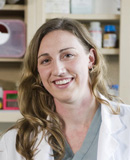 A dual love for medicine and for international travel would not necessarily lead you to Bangladesh. During the monsoon season. To study cholera. But that is where it’s taking Alison Kuchta.
A dual love for medicine and for international travel would not necessarily lead you to Bangladesh. During the monsoon season. To study cholera. But that is where it’s taking Alison Kuchta.
“Public policy, treating people, prevention – all these aspects of international health research appeal to me,” explains Kuchta, who admires physicians who must hone their diagnostic skills and techniques as they work without technologies like CT scans.
The M.D./Ph.D. student flew to Bangladesh in August for a yearlong fellowship supported by the NIH’s Fogarty International Center. This exposure to the field of public health will be an essential step in her growth as a physician-scientist focused on global medicine.
With an eye toward applying science’s tools of vaccine development and field trials to real world problems, Kuchta spent the Ph.D. phase of her training in the microbiology labs of Michael McVoy, Ph.D. The professor of pediatric infectious disease studies the biology of cytomegalovirus, and Kuchta’s work with his team revolved around a protein that may be
important in CMV’s replication.
Now, Kuchta heads to Bangladesh and the bacteria that causes cholera. Usually spread through contaminated water, its severe diarrhea and vomiting result in dehydration that can bring death within hours. It is easily controllable with IV fluids and supportive therapy, but not for those who have limited access to health care in Bangladesh’s low-lying, flood-prone areas.
She’s heard from other Fogarty students about the 1,000-bed tent that is erected annually to treat these patients. “I’ll get very good at starting IVs on dehydrated patients,” she says.
Kuchta will split her time between the clinic, the lab and epidemiologic efforts examining the factors that contribute to this disease’s hold on Bangladesh. Her work in the research lab will focus on the body’s immune cell response. Kuchta explains: “There are multiple strains of cholera, and kids are very susceptible; they can get it again and again. By adulthood, they are completely resistant. But current vaccines against the disease do not infer that lifelong immunity.”
Researchers hope their work with the immune system’s B and T cells will deliver an improved vaccine and, ultimately, improved health.

